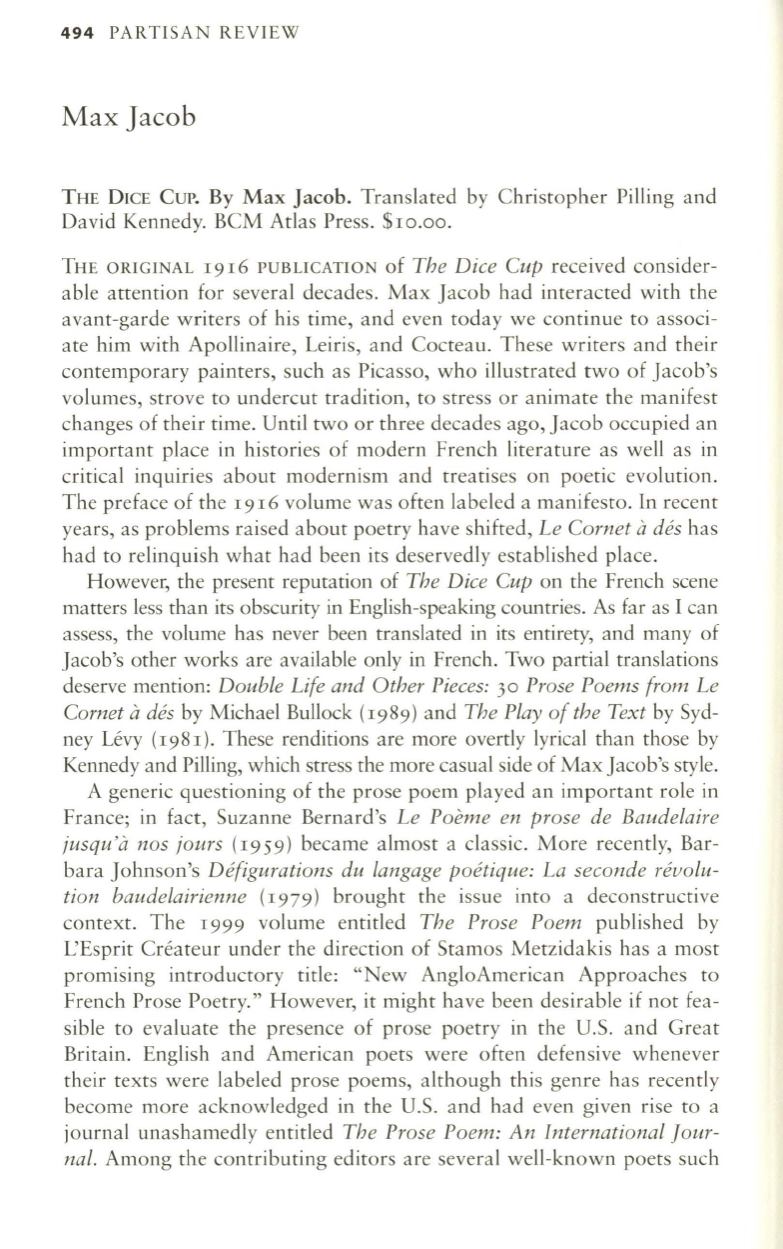
494
PARTISAN REVIEW
Max Jacob
THE DICE CUP. By Max Jacob. Translated by Christopher Pilling and
David Kennedy. BCM Atlas Press.
$10.00.
THE ORIGINAL
1916
PUBLICATION of
The Dice Cup
received consider–
able attention for several decades. Max Jacob had interacted with the
avant-garde writers of his time, and even today we continue to associ–
ate him with Apollinaire, Leiris, and Cocteau. These writers and their
contemporary painters, such as Picasso, who illustrated two of Jacob's
volumes, strove to undercut tradition, to stress or animate the manifest
changes of their time. Until two or three decades ago, Jacob occupied an
important place in histories of modern French literature as well as in
critical inquiries about modernism and treatises on poetic evolution.
The preface of the
1916
volume was often labeled a manifesto. In recent
years, as problems raised about poetry have shifted,
Le Cornet a des
has
had to relinquish what had been its deservedly established place.
However, the present reputation of
The Dice Cup
on the French scene
matters less than its obscurity in English-speaking countries. As far as I can
assess, the volume has never been translated in its entirety, and many of
Jacob's other works are avai lable only in French . Two partial translations
deserve mention:
Double Life and Other Pieces:
30
Prose Poems from Le
Cornet a des
by Michael Bullock
(1989)
and
The Play of the Text
by Syd–
ney Levy
(1981).
These renditions are more overtly lyrical than those by
Kennedy and Pilling, which stress the more casual side of Max Jacob's style.
A generic questioning of the prose poem played an important role in
France; in fact, Suzanne Bernard's
Le Poeme en prose de Baudelaire
jusqu'a nos jours
(1959)
became almost a classic. More recently, Bar–
bara johnson's
Defigurations du langage poetique: La seconde revolu–
tion baudelairienne
(1979)
brought the issue into a deconstructive
context. The
1999
volume entitled
The Prose Poem
published by
L'Esprit Createur under the direction of Stamos Metzidakis has a most
promising introductory title: "New AngloAmerican Approaches to
French Prose Poetry." However, it might have been desirable if not fea–
sible to evaluate the presence of prose poetry in the U.S. and Great
Britain. English and American poets were often defensive whenever
their texts were labeled prose poems, although this genre has recently
become more acknowledged in the U.S. and had even given rise to a
journal unashamedly entitled
The Prose Poem: An International Jour–
nal.
Among the contributing editors are several well-known poets such


